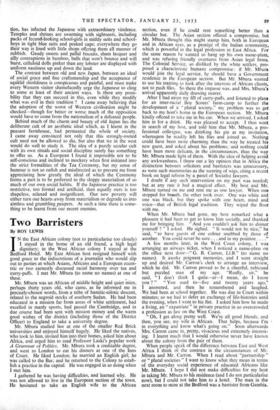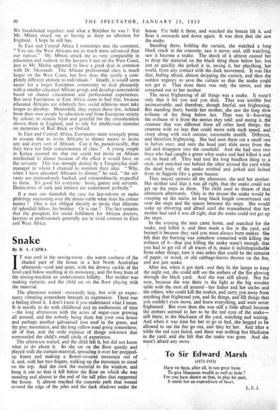Two Barristers
By ROY LEWIS
IN the East African colony (not to particularise too closely) I stayed in the home of an old friend, a high legal dignitary; in the West African colony I stayed at the Bedford Hotel. My East African host resigned himself with good grace to the indiscretions of a journalist who would slip out to parties at which Asians, Africans and a European eccen- tric or two earnestly discussed racial harmony over tea and curry-puffs. I met Mr. Mbura (to name no names) at one of these. _ Mr. Mbura was an African of middle height and quiet mien, perhaps thirty years old, who came, as he informed me in precisely=chosen words, from a tribe of hamitic-nilotic descent, related to the negroid stocks of 'southern Sudan. He had been educated in a mission far from areas of white settlement, had excelled in manly sports, had passed the -Cambridge, and in due course had been sent with mission money and the warm good wishes of the district (including those of the District Officer) to England to take a university degree. Mr. Mbura studied law at one of the smaller Red Brick universities and enjoyed himself hugely. Be liked the natives, who took to him, invited him into their homes, asked him about Africa, and urged him to read Professor Laski's popular work A Grammar of Politics. Mr. Mbura took a creditable degree, and went to London to eat his dinners at one of the Inns of Court. He liked London; he married an English girl; he was called to the Bar; and he returned to the Colony to estab- lish a practice in the capital. He was engaged in so doing when I met him.
I gathered he was having difficulties, and learned why. He was not allowed to live in the European section of the town. He hesitated to take an English wife to the African section, even if he could rent something better than a circular hut. The Asian section offered a compromise, but Mr. Mbura thought this might stamp him, both in European and in African eyes, as a protégé of the Indian community, which is powerful in the legal profession in East Africa. For the same reason he wanted to hang up his own name-plate, and was refusing friendly overtures from Asian legal firms. The Colonial Service, so disliked by the white settlers, pro- posed a characteristic humane compromise : if Mr. Mbura would join the legal service, he should have a Government residence in the European section. But Mr. Mbura wanted to use his training to look after the interests of African clients, not to push files. So there the impasse was, and Mrs. Mbura's arrival apparently daily drawing nearer. After I had eaten my fill of curry-puffs, and listened to plans for an inter-racial Boy Scouts' farm-camp to further the development of a "plural society," my problem was to get back to my host's home in the European section. Mr. Mbura kindly offered to take me in his car. When we arrived, I asked him in for a drink. He was pleased to accept. I then went in search of my host, and told him that Mr. Mbura, a pro- fessional colleague, was drinking his gin at my invitation, whereupon he readily left his files and joined us. Nothing could have been more charming than the way he treated his new guest, and asked about his problems; and nothing could have been more delicate, in the circumstances, than the way Mr. Mbura made light of them. With the idea of helping avoid any awkwardness, I threw out a lay opinion that in Africa the distinction between solicitors and barristers was unnecessary, as were such mummeries as the wearing of wigs, citing a recent book on legal reform by a panel of Socialist lawyers. I doubt if any such intervention on my part was needed; but at any rate it had a magical effect. My host and Mr. Mbura turned on me and rent me as one lawyer. When one stopped for breath, the other took over. One was white and one was black, but they spoke with one heart, mind and voice—that of British legal tradition. They wiped the floor with me.
When Mr. Mbura had gone, my host remarked what a pleasure it had been to get to know him socially, and thanked me for bringing him. "And you couldn't ask him to dinner yourself ? " I asked. He sighed. "It would not be nice," he said, "to have guests of one colour snubbed by those of another. You could never be sure ... and in my position . ."
A few months later, in the West Coast colony, I was arranging au airways ticket, when I noticed a name-plate on the office next door—" G. B. Carron, Ll.B." (to name no names). It awoke poignant memories, and I went straight up and desired Mr. Carron's clerk to arrange an interview. which he did. Mr. Carron proved to be a cheerful, rubicund but puzzled man of my age. "Really, sir," he said, "I don't think I quite—er—I mean, do I know you ? " "You used to—five and twenty years ago," I answered, and then he remembered and laughed. We had been at school together. He was due in Court within minutes; so we had to defer an exchange of life-histories until the evening, when I went to his flat. I asked him how he made a living, an " expatriate " in private practice in so overcrowded a profession as law on the West Coast.
Oh, I get along pretty well. We're all good friends, and then, you see, my wife is African. That helps, because I'm in everything and know what's going on." Soon afterwards Mrs. Carron came in, pretty, vivacious and extremely interest- ing. I learnt much that I would otherwise never have known about the colony from the pair of them.
When people speak of the difference between East and West Africa I think of the contrast in the circumstances of Mr. Mbura and Mr. Carron. When I read about "partnership" or "plural societies" I want to know what they mean in terms of the everyday social experience of educated Africans like Mr. Mbura. I hope I did not make difficulties for my host in taking Mr. Mbura to his' residence (and I do not particularise now), but I could not take him to a hotel. The man in the next room to mine at the Bedford was a barrister from Gambia. We breakfasted together; and what a Britisher he was ! Yet Mr. Mbura struck me as having as deep an affection for England. I hope he still has.
In East and Central Africa I sometimes met the comment, "You see, the West Africans are so much more advanced than our natives." Mr. Mbura struck me as very comparable in education and outlook to the lawyers I met on the West Coast, just as Mr. Mathu appeared to have a good deal in common with Dr. Nkrumah. The African professional class is much larger on the West Coast, but how does this justify a com- pletely different attitude to individuals ? Ideally, it would seem easier for a larger European community to deal pleasantly with a smaller educated African group, and develop cameraderie- based on shared educational and professional experiences. But most Europeans in East Africa seem to feel that, because educated Africans are relatively few, social relations must take longer to develop. Meanwhile, they expect those few, isolated from their own people by education and from European society by colour, to remain loyal and grateful for the consideration shown them in England, and to rely for intellectual stimulus on memories of Red Brick or Oxford.
In East and Central Africa, Europeans seem strangely prone to assume that to invite Africans to dinner means to invite any and every sort of African. Can it be, paradoxically, that they have too little consciousness of class ? A young couple in Kenya assured me that one could not invite an African intellectual to dinner because of the effect it would have on the servants. This was strongly denied by a Tanganyika sisal- manager to whom I chanced to mention their idea. "Why, when I have educated Africans to dinner," he said, "the ser- vants are .tremendously bucked, and extraordinarily respectful to them. It's good for everyone : hosts, guests and servants. Distinctions of rank and interest are understood perfectly."
If a man can demolish the case for law-reform or make philology interesting over the dinner-table what does his colour matter ? One is not obliged thereby to.,invite that illiterate (if splendid) fellow, his brother. Or is one ? The fact remains that the prospects for social fulfilment for African doctors, lawyers or professionals generally are in vivid contrast in East and West Africa.



































 Previous page
Previous page